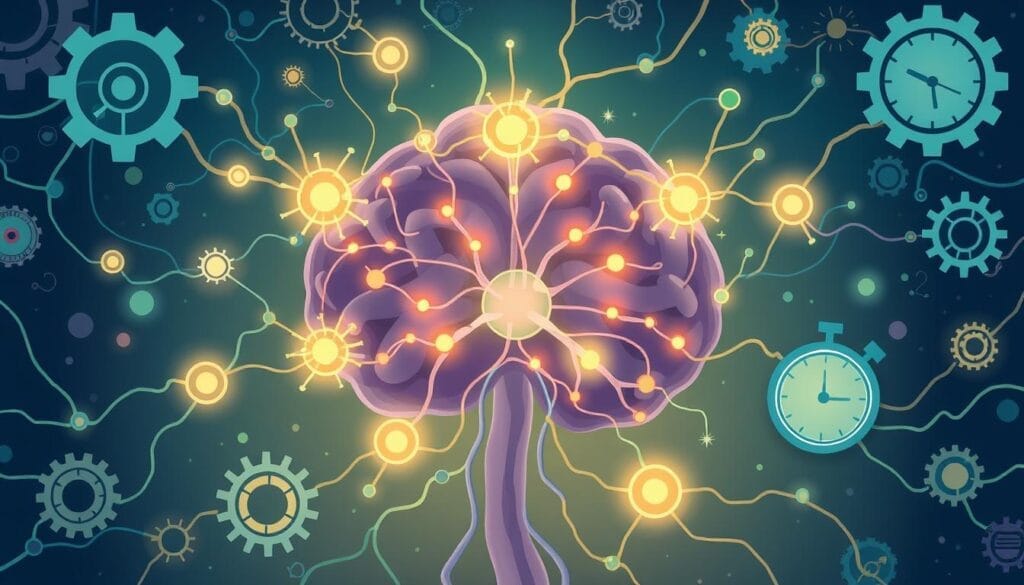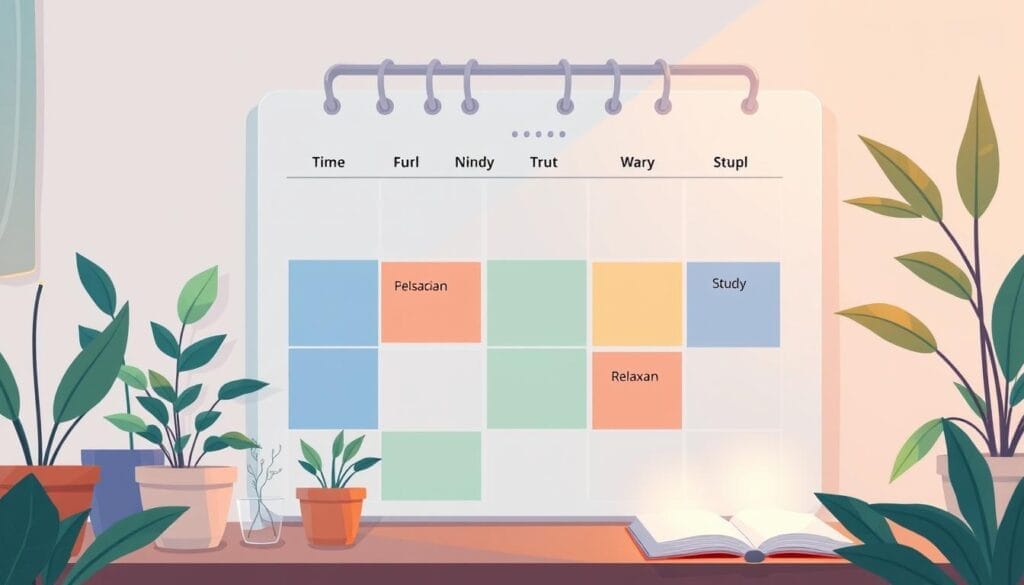What if your brain wasn’t tired because of overwork but because of poor routine?
Most people think their mental fatigue is due to a lack of motivation, when it’s actually a matter of biology. If you’re struggling to concentrate, think clearly, or feel mentally sharp, your brain might be running on the wrong schedule. Building a daily routine for optimal mental performance isn’t about adding more tasks—it’s about working with your brain, not against it.
In this blog, we will explore how to create a daily routine for optimal mental performance using brain science, real data, and simple changes. This isn’t guesswork. It’s neuroscience simplified for everyday life.
Table of Contents
ToggleMental Performance is not About Willpower
People often blame themselves for being unmotivated or distracted. But mental performance doesn’t come from willpower alone. It comes from brain chemicals (neurochemistry) and they run on a clock.
Here’s what key neurotransmitters do:
- Dopamine: Helps you stay motivated and seek rewards
- Serotonin: Keeps mood stable and supports memory
- Acetylcholine: Needed for deep focus and attention
- Cortisol: Wakes your brain up and keeps you alert early in the day
These chemicals change throughout the day. For example:
- Cortisol peaks 30–45 minutes after waking
- Acetylcholine rises during novel or focused tasks
So, to build a daily routine for optimal mental performance, you must time your activities to match these natural changes.
Read: Men’s Health and Mental Health: Why It Matters

Time-Restricted Mental States
Your brain has natural peaks and dips. Trying to push through them leads to burnout. Aligning with your brain’s natural rhythm, called circadian rhythm performance, gives better results with less effort.
Cortisol Awakening Response (6–9 AM): Best Time for Planning and Focus
Your brain is naturally alert early in the morning.
- Cortisol and norepinephrine are at their peak
- Ideal for deep work, problem-solving, and setting the day’s tone
- Harvard Business Review found 61% of executives make big decisions before 10 AM
Activities to do:
- Planning your schedule
- Writing important emails
- Working on strategy or learning something new
This window sets the tone for your daily routine for optimal mental performance.
Midday Dopamine Dip (1–3 PM): Protect Your Brain Energy
Post-lunch, your brain slows down.
- Dopamine dips
- Energy drops; focus fades
- 67% of people report fatigue after lunch (Sleep Foundation, 2022)
Best activities now:
- Walking meetings
- Listening to educational podcasts
- Filing or basic admin tasks
Avoid critical thinking during this dip.
Second Wind (4–6 PM): Time for Creativity and Problem Solving
Later in the day, the brain gets another boost.
- Cortisol decreases
- Alpha brain waves increase, linked to creativity (Journal of Neuroscience)
Best activities now:
- Brainstorming sessions
- Solving problems
- Creative writing
This “second wind” is often overlooked in a daily routine for optimal mental performance.
Read: Common Adult Mental Health Issues
Habits That Trigger the Right Brain Chemicals
Habits anchor your brain chemistry. With the right small actions, you can trigger better clarity, memory, and mood.
Light Exposure in the First 30 Minutes of Waking
Natural light exposure helps set your body clock.
- Boosts serotonin and stabilizes mood
- 10 minutes of sunlight = better alertness and better sleep
- People who get morning light sleep 46 minutes longer (American Academy of Sleep Medicine, 2021)
Tip: Step outside for 10–15 minutes after waking. No sunglasses.
Short Bursts of Movement = Dopamine Surge
Exercise changes your brain, not just your body.
- 15 minutes of intense movement = 200% spike in dopamine (MIT, McGovern Institute)
- Movement also boosts memory and alertness
Easy ways to do this:
- 7-minute HIIT workout
- Walking lunges in place
- 2–3 “movement snacks” a day
Cold Exposure: Fast Mental Boost
Cold exposure wakes your brain fast.
- 20 seconds in 50°F (10°C) water = 250% more norepinephrine (Nature Neuroscience, 2000)
- Sharpens alertness and mood
Easy option:
- End your shower with 20 seconds cold water
These habits form the base of your daily routine for optimal mental performance.

The 4-Layer Routine Schedule
Most people build routines around tasks. Instead, build it around how your brain feels.
| Layer | Focus | Purpose | Sample Activity |
|---|---|---|---|
| Ground | Hormone reset | Set circadian rhythm | Sunlight, hydration |
| Ignite | Neurotransmitter boost | Focus and performance | Deep work, planning |
| Sustain | Maintain clarity | Prevent fatigue | Walks, meals, music |
| Recover | Repair and recharge | Brain recovery | Sleep, journaling |
By rotating through these layers daily, you support your daily routine for optimal mental performance without burning out.

Avoid Burnout: Balance Your Brain Load
Most people ignore how much brainpower tasks require. That leads to crashes.
Fatigue is Due To Low Brain Glucose
Your brain is small, but it uses big energy.
- Uses 20% of the body’s energy (Scientific American)
- Focus drains glucose fast
Use the 90/20 rule:
- Work 90 minutes
- Take 20 minutes off
Short rests help restore attention.
Multitasking Wrecks Focus
Switching tasks feels productive. But it’s a trap.
- You lose 40% productivity when task switching (Stanford University)
- Focus drops, errors rise
Instead:
- Batch similar tasks
- Do deep work with no distractions
These are real mental performance hacks that prevent burnout.
What You Eat Changes How You Think
What you eat and when you eat affect focus, memory, and alertness.
Balance Your Blood Sugar for Better Thinking
Food that spikes sugar can crash brainpower.
- Rapid glucose rise = attention drop, fatigue
- Balanced meals keep BDNF (brain growth hormone) steady
Ideal macro split:
- 30% Fat
- 30% Protein
- 40% Low-GI carbs
Good meals:
- Eggs + whole grain toast
- Chicken + veggies + quinoa
These help you optimize focus daily.
Feed Your Brain Nutrients That Matter
Certain nutrients directly improve brain function.
- B12: Nerve repair
- DHA (Omega-3): Memory and focus
- Choline: Builds acetylcholine
- Magnesium: Reduces stress
Brain foods:
- Eggs, salmon, spinach, dark chocolate
- Omega-3s improve memory by 23% (British Journal of Nutrition, 2015)
Use food to support your daily brain health routine.

Sleep Wins the Long Game for Mental Sharpness
People overrate morning routines and underrate recovery. Sleep is the real performance booster.
Stop Tech Before Bed = Better Melatonin
Blue light blocks sleep hormone.
- Blue light reduces melatonin by 85% (Harvard Health, 2020)
Simple fix:
- Stop screens 2 hours before sleep
- Use warm light lamps
Sleep Clears Brain Toxins
Your brain cleans itself while you sleep.
- 95% of brain waste cleared in NREM sleep (NIH, 2013)
- Poor sleep leads to higher Alzheimer’s risk
Make sleep your brain’s priority.
Night Rituals Change Next Day Mood
Small habits before bed reshape emotions.
- Gratitude journaling cuts time to sleep by 15 minutes (Psychology Today)
- Read books like “Atomic Habits.”
Your routine for mental sharpness should always include sleep.
Everyone’s Brain Is Different: Customize Your Routine
One-size-fits-all routines fail because your brain is not like anyone else’s.
Are You a Morning Lark or a Night Owl? (Chronotype)
Your chronotype determines when your brain is naturally wired to be alert or sleepy.
- Morning types (Larks) have higher early-morning cortisol and melatonin that fades fast. They’re best at analytical thinking and planning before noon.
- Evening types (Owls) have delayed melatonin release and longer dopamine surges later in the day. They’re more creative and focused in the afternoon or night.
- Based on decades of chronotype research by Dr. Michael Breus, optimizing your tasks based on this rhythm boosts performance without extra effort.
Are You Dopamine- or Serotonin-Dominant? (Neurotype)
Your brain’s dominant neurotransmitter also shapes how you think and feel best.
- Dopamine-dominant types crave challenge, novelty, and reward. They excel in environments that offer variety and stimulation.
- Serotonin-dominant types seek stability, structure, and peace. They perform best with routine and predictability.
- These insights come from neurotyping models like Thibarmy, used in performance coaching and psychology.
Adapt your biohacking routine for mental clarity by aligning it with your chronotype and neurotype. You’ll stop forcing productivity and start flowing with your brain’s natural design.
A Sample Day for High Mental Performance
Here is a sample peak brain function routine:
| Time | Action | Brain Trigger |
| 6:30 AM | Sunlight + water | Cortisol spike, hydration |
| 7:00 AM | Light movement | Dopamine release |
| 8:00 AM | Protein breakfast | Glucose balance, acetylcholine |
| 9:00 AM | Deep work | Focus peak |
| 11:15 AM | Walk + green tea | Calm reset (L-theanine) |
| 1:00 PM | Low-GI lunch | Blood sugar steady |
| 2:00 PM | Passive tasks | Dopamine dip |
| 4:00 PM | Brainstorm / idea work | Alpha wave surge |
| 6:00 PM | Light exercise / music | Endorphins boost |
| 8:30 PM | Journal + magnesium | Relaxation, melatonin prep |
| 10:00 PM | Sleep | Glymphatic flush, memory build |
This is what a science-backed daily routine for optimal mental performance looks like.
Final Thoughts from Dr. Chugh
If you’ve been feeling stuck, foggy, or tired no matter how much you try, it’s time to stop blaming yourself. It’s not a motivation problem. It’s likely your routine isn’t matching your brain’s rhythm.
As a neurologist, I’ve worked with people who improved their thinking, mood, and focus just by changing their daily schedule. You don’t need extreme hacks. Just a smarter routine.
If you’d like help tailoring a daily routine for optimal mental performance to your unique brain type, book a consultation with me today.
FAQs
Q1: What is the key to mental performance throughout the day?
A: Aligning your activities with your body’s natural rhythms and maintaining consistency in sleep, diet, and exercise.
Q2: How does mindfulness help with focus?
A: It trains the brain to stay present, reducing stress and boosting cognitive clarity.
Q3: What should be included in a morning routine for mental energy?
A: Exercise, a nutritious breakfast, sunlight exposure, and avoiding distractions.
Q4: How do breaks improve productivity?
A: Short breaks recharge your brain, reduce decision fatigue, and enhance focus.
Q5: Can evening routines impact mental performance?
A: Yes. Relaxing rituals and limiting screen time support better sleep and next-day focus.
About The Author

Medically reviewed by Dr. Chandril Chugh, MD, DM (Neurology)
Dr. Chandril Chugh is a U.S.-trained, board-certified neurologist with expertise in diagnosing and managing neurological disorders, including migraines, epilepsy, Parkinson’s disease, and movement disorders. His clinical focus includes evidence-based neurological care and patient education.
All content is reviewed for medical accuracy and aligned with current neurological guidelines.




